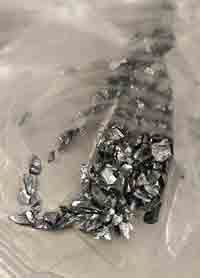High-Quality, Low Cost Si Pellets
 The material is produced in a standard granulate size of 1 / 8 '' x 1.8 '' and the film is offered in two sizes: 1 mm and 2 mm x 2.5 mm. The film can be offered as a single film or as part of a multi-film package in standard and granulate sizes from 1: 8 to 1: 8.
The material is produced in a standard granulate size of 1 / 8 '' x 1.8 '' and the film is offered in two sizes: 1 mm and 2 mm x 2.5 mm. The film can be offered as a single film or as part of a multi-film package in standard and granulate sizes from 1: 8 to 1: 8.
The University of Wafer, Inc. specializes in the production of high-performance, low-cost, high-quality silicon pellets. The University's Wafer Inc. pours a wide range of films in a variety of processed shapes, from single films to multiple films, in both standard and granulate sizes.
The University's Wafer, Inc. processes silicon pellet films in a variety of shapes, from single films to multiple films, and other shapes are available on request. Silicon is produced in two types of films: standard and granulate formats, and single- and multi-layer forms.
What are Silicon Pellets Used For?
Silicon pellets are mainly used in various industrial applications due to silicon's unique properties. Here are some primary uses:
Semiconductor industry: Silicon pellets are most prominently used in the production of silicon wafers for the semiconductor industry. These wafers are used as the substrate for microelectronic devices built in and over the wafer and undergo many microfabrication processes, such as doping, ion implantation, etching, thin-film deposition of various materials, and photolithographic patterning.
Solar Panels: Silicon pellets are used in the manufacturing of photovoltaic solar panels. These solar panels convert sunlight into electricity. Silicon's properties as a semiconductor make it an excellent material for this purpose.
Alloy Production: Silicon pellets are used in the production of silicon-based alloys. Silicon is commonly alloyed with aluminum to make the aluminum alloy more durable, harder, and less prone to warping or swelling.
Steel Industry: In steelmaking, silicon is used as a deoxidizer in the manufacturing process. It's also a key ingredient in certain grades of steel where it's used to increase strength and hardness.
Chemical Industry: Silicon is a key raw material in producing silicones, a diverse family of synthetic polymers. These silicones have a wide range of commercial applications, from lubricants to adhesives, sealants, and insulators.
Introduction To Silicon Pellets: Exploring The Properties And Applications Of High-Purity Silicon-Based Pellets
Silicon, the second most abundant element on Earth, holds immense importance in various industries due to its exceptional properties. One of the versatile forms in which silicon is utilized is as silicon pellets. These high-purity silicon-based pellets have garnered significant attention due to their unique characteristics and wide-ranging applications. Silicon pellets are manufactured by refining raw silicon through a meticulous process that ensures exceptional purity levels.
This high-purity composition allows these pellets to exhibit remarkable properties, making them suitable for a diverse range of applications. For instance, their excellent thermal conductivity and electrical properties make them ideal for use in semiconductors and electronics manufacturing. Furthermore, the chemical stability of silicon pellets enables their utilization in various corrosive environments. Their resistance to oxidation and other harsh conditions makes them desirable for applications such as solar panels, where they serve as efficient photovoltaic materials.
Moreover, the mechanical strength of silicon pellets plays a crucial role in industries like automotive manufacturing and construction. With their ability to withstand high temperatures and pressures, these pellets find application in engine components, building materials, and even as additives for alloys. In this article, we will delve into the fascinating properties of silicon pellets while exploring their wide array of applications across industries.
Understanding The Role Of Silicon Pellets In Solar Panel Technology: A Comprehensive Overview
Silicon pellets play a crucial role in the advancement of solar panel technology. These small, cylindrical pieces serve as the building blocks for solar cells, which are the heart of any photovoltaic (PV) system. The utilization of silicon pellets has revolutionized the efficiency and affordability of solar panels, making them increasingly accessible as a renewable energy source. The significance of silicon pellets lies in their unique electrical properties.
When combined with other materials, such as phosphorus and boron, silicon forms a semiconductor capable of generating electricity when exposed to sunlight. By doping the silicon with these impurities, an electric field is created within each pellet, allowing electrons to move freely and generate an electrical current. Moreover, advancements in manufacturing techniques have enabled the production of high-quality silicon pellets at a reduced cost.
The introduction of monocrystalline and polycrystalline silicon has dramatically improved solar panel efficiency by increasing light absorption and minimizing energy loss. This comprehensive overview aims to explore various aspects related to silicon pellets in solar panel technology. It will delve into their manufacturing processes, including crystallization methods and purification techniques. Additionally, it will discuss how different types of silicon pellets impact overall system performance and explore emerging trends in pellet design.
The Importance Of High-Purity Silicon Pellets In Solar Cell Production: Key Considerations And Benefits
The importance of high-purity silicon pellets in solar cell production cannot be overstated, as they play a crucial role in ensuring the efficiency and longevity of solar panels. High-purity silicon pellets are used as the main raw material for manufacturing solar cells, which are the building blocks of solar panels. One key consideration in using high-purity silicon pellets is their superior quality and purity levels.
These pellets are typically made from ultra-pure polycrystalline silicon, which contains minimal impurities such as metals, dopants, and other trace elements. This high level of purity is essential because any impurities can significantly degrade the performance of solar cells. Another important benefit of using high-purity silicon pellets is their ability to enhance the efficiency of solar cells. The purity and consistency of these pellets ensure that each cell produced has optimal electrical properties, resulting in better energy conversion rates.
Additionally, their uniformity allows for more precise control during the manufacturing process, leading to improved overall panel performance. Moreover, high-purity silicon pellets contribute to the longevity and reliability of solar panels. With lower impurity levels, there is reduced risk of material degradation or device failure over time. This ensures that solar panels can continue generating electricity efficiently for many years.
Exploring The Wide Range Of Applications For Silicon Pellets Beyond Solar Panel Technology
Silicon pellets, commonly associated with their extensive use in solar panel technology, have now emerged as a versatile material with a myriad of applications across various industries. While solar energy remains a significant sector benefiting from silicon pellets, their potential extends far beyond this scope. In the realm of electronics and semiconductors, silicon pellets play a pivotal role in the manufacturing of microchips and transistors.
Their exceptional thermal conductivity and electrical properties make them ideal for creating high-performance electronic components. Additionally, silicon pellets are utilized in the production of optical fibers, where their purity and excellent light transmission qualities are highly valued. Beyond electronics, silicon pellets find utility in the automotive industry. They are incorporated into advanced lithium-ion batteries that power electric vehicles due to their ability to enhance battery efficiency and performance.
Furthermore, these tiny grains contribute to manufacturing lightweight materials used in automobile construction, resulting in improved fuel efficiency. The healthcare sector also benefits from the remarkable properties of silicon pellets. They are integral to producing medical implants such as pacemakers and prosthetics due to their biocompatibility and durability. In conclusion, while solar panel technology initially brought attention to silicon pellets, their potential applications have expanded significantly.
Unveiling The Remarkable Properties And Advantages Of Silicon-Based Pellets
Silicon-based pellets, a breakthrough innovation in material science, have garnered significant attention in various industries due to their remarkable properties and numerous advantages. These tiny yet powerful pellets are composed primarily of silicon, a chemical element abundantly found in the Earth's crust. One of the most notable properties of silicon-based pellets is their exceptional thermal conductivity. This characteristic allows them to efficiently transfer heat, making them ideal for applications requiring effective heat management.
Furthermore, their high melting point ensures stability even under extreme temperatures, making them suitable for use in demanding environments. Another advantage lies in their electrical properties. Silicon-based pellets possess excellent semiconducting qualities, enabling them to be utilized in electronic devices and integrated circuits. Their ability to control the flow of electricity makes them indispensable components within advanced technologies such as smartphones, computers, and solar panels.
Moreover, silicon-based pellets exhibit exceptional hardness and resistance to corrosion and wear. These attributes make them highly durable materials suitable for various industrial applications like coatings and abrasives. Additionally, as silicon is an abundant element on Earth, these pellets offer a sustainable alternative compared to other materials with limited availability or those derived from non-renewable resources.
